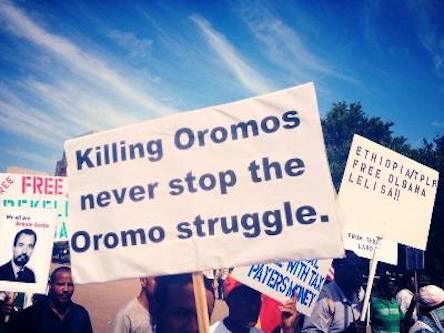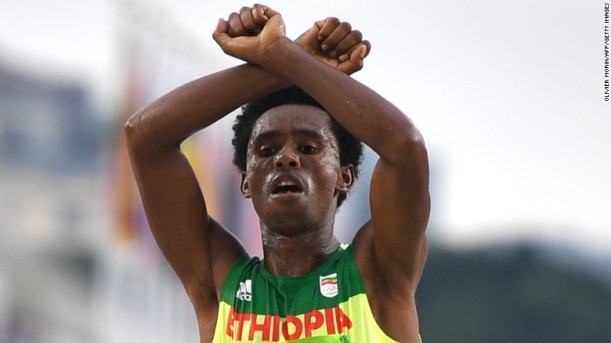Paul Gora
Ethiopia is facing a crisis of unprecedented magnitude, yet its government and Western enablers refuse to acknowledge the depth of the crisis. The nation-wide protest, which started in the Oromyia region, is one that threatens to degenerate into a full-scale social explosion.[1] These protests are an extraordinary display of defiance by Ethiopia’s people against a repressive government.
While protests began in small villages and towns in 2014, the protests erupted in early July 2016 after a development plan was released that sought to expand the territorial limits of Ethiopian capital Addis Ababa in to Oromyia villages and towns. This was seen as a move to further accelerate the Oromo farmer evection from their ancestral land.[2] The government dismissed the protesters as “anti-peace” elements and accused them of acting in collaboration with a terrorist group, a common tactic used by Ethiopian government to crackdown on dissident opposition.
Although, these protests are triggered by recent events, they actually represent a more enduring and deeper crisis of political misrepresentation and systematic marginalization suffered by other ethnic groups in Ethiopia.[3] Historically, this tension exists because the government is tribal oriented ( i.e.Tigryan ) and they pushed out all other non-Tigrayan peoples, marginalizing them in their own country and deeming them unworthy of respect and consideration. In particular, the Oromos’ culture and language have been banned, their identity stigmatized, rendering them virtually invisible because their voices are not heard in the political process. When the current government came to power a quarter century ago, the Tigray People’s Liberation Front (TPLF), presented itself as the only political movement in the country that could provide stability to Ethiopia. As a result, the country gained greater support from the regional and global powers, who seem to have a vested interest in the region.

The US-led “War on Terror” provided the Ethiopian government with a political and legal instrument with which the government justified severe restriction on freedom of expression, association, and assembly. The 2009 Anti-Terrorism Proclamation enabled the government to stretch its power of prosecution and punishment beyond what is permissible under criminal and constitutional law. Under the pretext of fighting terrorism, the regime exiled and prosecuted several opposition leaders, journalists, bloggers, and activists.[4]
The government used overwhelming force to crush the protesters, killing hundreds of protesters and arresting thousands. Human Rights Watch criticized the excessive and lethal force used by security forces against the mostly peaceful protesters. Although the death toll is estimated at over 400, some activist groups think it is actually much higher. The protesters are demanding the international community to respond and openly condemn the regime in Addis Ababa and to withdraw its support for the repressive government.[5]
It remains unclear as to why IGAD, a regional body, or the UN, or the international community as a whole have yet to condemn the atrocities being carried out by Ethiopian government on its own people. Even now, the international community is still funding the government, who is brutally kill unarmed peaceful demonstrators.
The role of the international community

Most recently, at the 2016 Rio Olympics, Fiyesa Lilesa crossed the finish line of the men’s Marathon with his arms cross over his head in a gesture of solidarity with the Oromos to symbolize the protest against the government’s policies that targeted his ethnic group. The Oromos have been using this gesture as symbol of protest against the Ethiopian government for the last two years.
The international community seems to have ignored what is happening in Ethiopia. Back in 2012, when uprising began in Benghazi, Libya, the international community reacted quickly to condemn the Libyan government for the use of excessive forces against unarmed protesters. Some countries cut-off their diplomatic relations with the Libyan government and the UN Security Council passed a resolution that stated the situation in Libya is a threat to international peace and security under Chapter VII of UN Charter.
The current crisis in Ethiopia is clearly a threat to the region and beyond. The African Union, its International Governmental Authority on Development (IGAD), and the international community should condemned it openly. The Security Council should pass a resolution calling upon the Ethiopian authorities to stop the use of force against peaceful protesters, to protect human rights, and promote rule of law. Furthermore, the international community should take steps to impose sanctions on the Ethiopian government and stop financially supporting the government.
Perhaps the actions of Fiyesa Lilesa will have opened the world’s eyes. Unfortunately, Ethiopians do not have too long to wait.
Paul Obang Gora is an LL.M. student in the Law of the United States (LOTUS) program at UB Law. He has an LL.B. from the Ethiopian Civil Service College, Addis Ababa (2000) and a certificate for six-months’ training for judges and prosecutors. He served as an assistant prosecutor in Ethiopia from 2001-2003, but fled to Kenya because of political persecution. He was a community organizer in the refugee camps in Kenya and then served in the new South Sudan Ministry of Justice as legal counsel from 2008-12, prior to emigrating to the U.S. Paul is on the Elective Concentration Track, specializing in International Law, and working as an intern with the International Rescue Committee.
[1] http//: http://www.humanrights watch /Ethiopia crisis /report
[2] http//: http://www.hrw.org/world –report/2015/country-chapters/Ethiopia
[3] www.voanews.com/a/ethiopia – ethiopia-dismisses-human-rights-watch-report
[4] http//:en.wikipedia.org/wiki/human_rights_in_ethiopia

